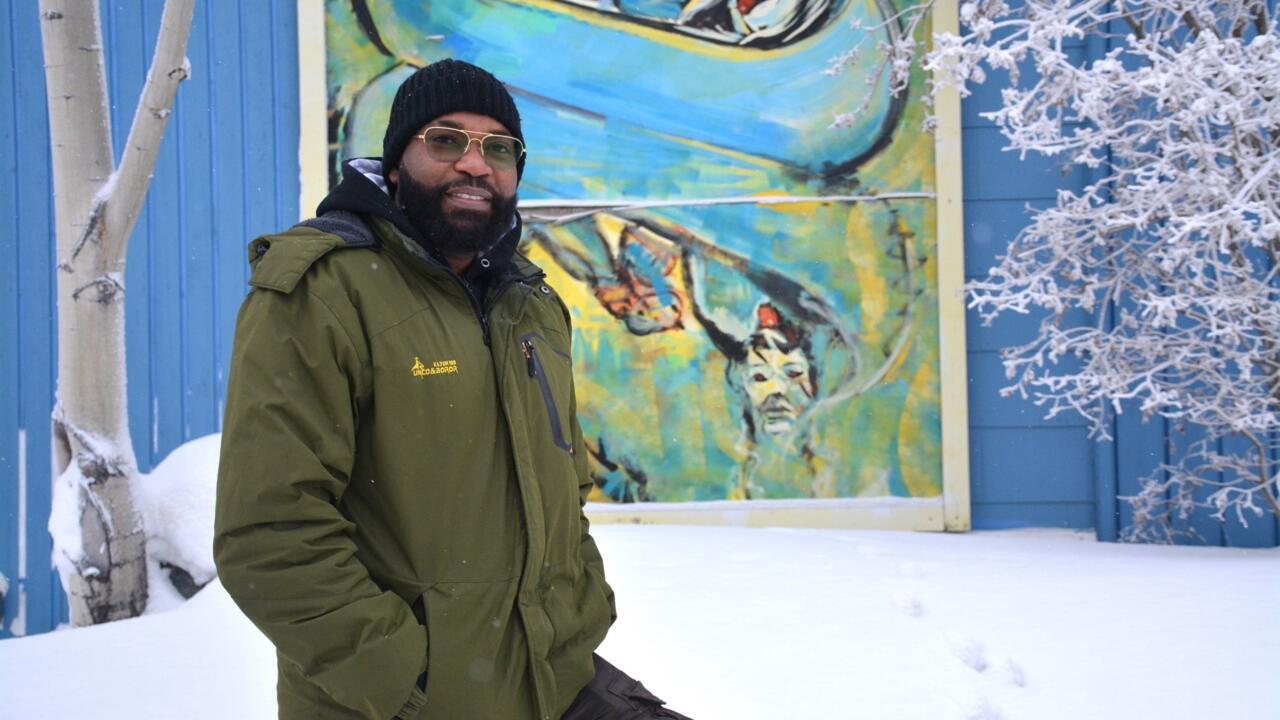Free portrait
Jonel Louis-Jean, a Haitian in the Far North, barber by day, artist by night
Jonel Louis-Jean, 43, left his country in 2013, but it still lives there. Based in Yellowknife, in the Northwest Territories of Canada, the Haitian immigrant, barber during the day for the inhabitants of the small polar town, takes advantage of his free time to develop his artistic talents and carry the voice of Haiti's emigrants .
Jonel Jean-Louis, barber and artist in Yellowknife, Canada, January 19, 2024. © Léopold Picot / RFI
By: Léopold Picot Follow
Advertisement
Read more
From our correspondent in Canada,
It's -35°C, feels like -41°C, in Yellowknife, in the middle of January. In the largest city in the Northwest Territories, population just over 20,000, trash cans freeze on the streets in winter, the Northern Lights dot the night sky and Asian tourists, recognizable red jackets, wait for daylight to fade. sleep to go see them.
Overlooking the main avenue, a discreet storefront says “LJJ Barber Shop”. A blue, industrial door opens onto a huge hairdressing salon. With a well-trimmed beard, mischievous look and fashionable clothes, Jonel Louis-Jean looks more thirty-something than forty-year-old. The cold of Yellowknife, perhaps? Not really ! The barber of Haitian origin admits to going out as little as possible in winter. “
What I like here is that it’s a quiet town. Almost everyone is a Canadian or foreign immigrant
,” confesses the 43-year-old man.
Migrate from south to north
Jonel Louis-Jean was born in Haiti, in Port-de-paix. Originally, he did not want to leave his country. “
I was a radio presenter, I had a show that dealt with varying subjects, social, political subjects… and one day, I denounced bribes from politicians in neighborhoods
,” sighs the barber . He begins to receive phone calls, to be intimidated and threatened. In 2013, Jonel decided to flee and emigrated to Brazil: “
It was a country that made me dream, but in 2015, the economic situation in the country became catastrophic. I couldn't live anymore.
»
Jonel therefore crosses the border between the United States and Mexico, after having done his papers “
quite quickly, in a few days
”, and arrives with family in Florida. There, he learned the barber trade in African-American salons. A year later, “
on May 3, 2017,
” he specifies, Jonel moved to Canada and arrived in Montreal, where a large Haitian community lives. “
I worked in a plastic bag factory from 11 p.m. to 7 a.m., then I had a job as a barber from 10 a.m. to 6 p.m.
,” describes Jonel without losing his crooked smile.
Finally, he found another job a few months later, at the Yellowknife airport, in the far north of Canada. As winter comes, he is responsible for guiding planes on the ground. “
I had never experienced a winter like this, it was my first in Canada. Brazil, Florida, Haiti… it’s not the same level of winter
,” laughs the worker. He was also marked by his first summer in the Far North, where he discovered the midnight sun of Yellowknife, the absence of darkness during the night.
One of Jonel Jean-Louis' paintings, in Yellowknife, Canada, in January 2024. © Jonel Jean-Louis
Develop your business
Seeing the second winter coming, Jonel decides to stop his work at the airport - “
I couldn't feel my feet anymore
,” laughs the barber. He finds odd jobs, while taking online courses to study social psychology. The idea of opening your own salon is gaining ground during confinement. “
When I arrived in Yellowknife, I was refused several times to do my hair because they didn't know how to do afro cuts
,” he says.
At the end of the pandemic, he returned to one last job, time to find premises, to set up his own business in January 2022. From now on, he fills a gap for the entire Yellowknife community. He feels fulfilled: “
I like the contact, seeing the smile of customers when they are well cut, working in the beauty industry, it makes me happy
.”
Rediscover artistic expression
But Jonel is not limited to his work, although it is demanding: he rediscovered his passions during the pandemic. He paints, a lot. “
It’s my mode of expression, I give birth to my ideas, without embarrassment, easily, and I like the idea of mixing colors to make one, it’s a beautiful symbol
,” he summarizes. Jonel notably painted great men and women of Pan-Africanism, from Aimée Césaire to Barack and Michelle Obama, including Thomas Sankara.
He misses Haiti. “
I hope that peace and security can resurface there. When I returned to my country, I rediscovered the smells, the colors
,” explains Jonel. This weight and resentment, which weigh so heavily on him, the barber artist relieves with music, which he discovered while singing in the church, on his native island.
For his first song, he first talks about Haiti and its pain, before defending his point of view on the geopolitical situation. “
I returned to music after giving up in Brazil where I played in a reggae group. But I'm not just talking about Haiti,
Jonel defends himself,
I'm also talking about love and betrayals!
". The jack-of-all-trades artist hopes to release a full album by the end of the year: the music is ready, all that's missing is the mixing.
Newsletter
Receive all the international news directly in your inbox
I subscribe
Follow all the international news by downloading the RFI application
Share :
Continue reading on the same themes:
Canada
Haiti
Culture
our selection
Free portrait

